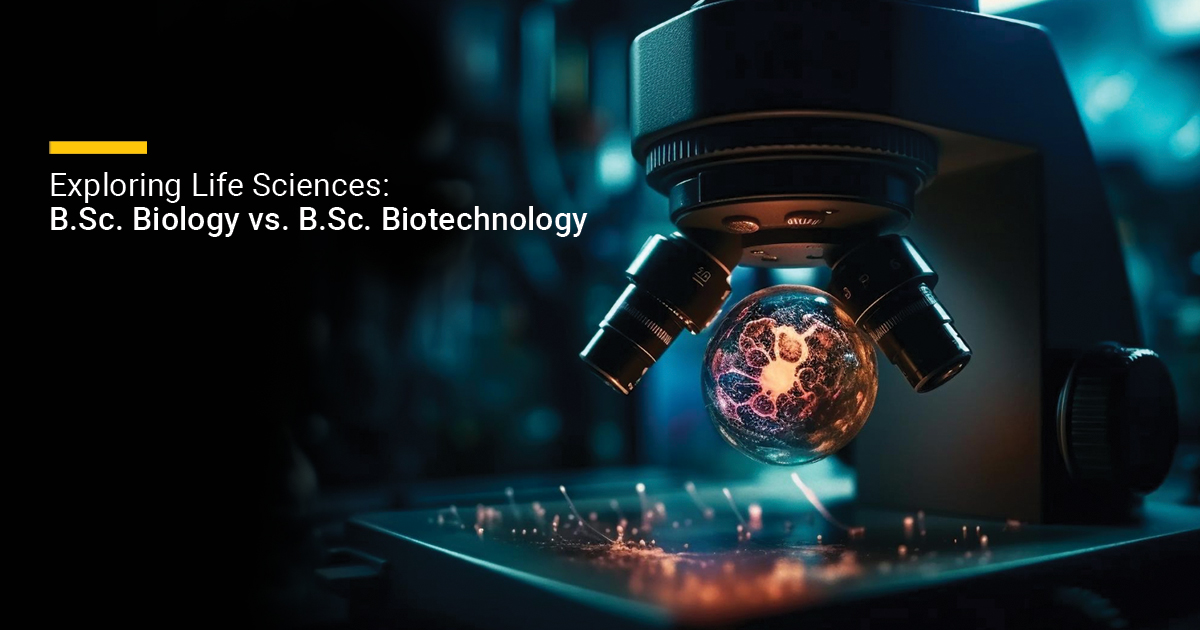Blog Detail


Exploring Life Sciences: B.Sc. Biology vs. B.Sc. Biotechnology
25-09-2024

The life sciences, which comprise the study of living things and their interactions, offer a vast and fascinating knowledge landscape. Regarding challenges and opportunities, choosing between a Bachelor of Science in Biology and a Bachelor of Science in Biotechnology may be exciting for you if you are planning to pursue one of the courses. While both courses aim to comprehend life's intricacies, their approaches, areas of concentration, and job opportunities are very different. The constantly expanding area of biological sciences opens up a world of research, innovation, and significant contributions, regardless of your intended path. Based on your interests, career goals, and preference for more conventional or practical learning experiences, you can determine the suitable option.
A thorough undergraduate programme that explores the fundamentals of living things is the B.Sc. in Biology. It provides access to knowledge about life on various levels, from the intricate ecosystems that shape our planet to the microscopic world of cells. You get the chance to investigate the complex web of life as a B.Sc. Biology student by learning about how creatures behave, adapt and engage with their surroundings.
The B.Sc. Biotechnology programme, on the other hand, is a highly specialised area of the life sciences that focuses on using biological concepts to improve technological development. The goal of this curriculum is to provide you with the information and abilities you need to alter biological systems in real-world situations. A distinct feature of B.Sc. Biotechnology is its emphasis on hands-on laboratory experience. Students often engage in practical experiments, learning techniques such as DNA manipulation, protein expression, and microbial fermentation.
Course duration
B.Sc. Biology programmes often follow a traditional structure spanning three years, covering a broad spectrum of biological sciences. The three-year duration allows you to delve into diverse areas such as genetics, ecology, physiology, and microbiology, providing a holistic understanding of life sciences. This extended timeframe permits a more in-depth exploration of biological concepts and allows for elective courses, enabling you to tailor your studies to specific interests within the field.
B.Sc. Biotechnology programmes also typically adhere to the standard three-year duration. However, the focus is on a more specialised and applied curriculum. Students engage in hands-on laboratory work, gaining proficiency in techniques relevant to biotechnological applications. The condensed yet intensive nature of the programme ensures that you are equipped with the skills necessary for immediate entry into the workforce, where the demand for biotechnologists is high.
Curriculum
A B.Sc. Biology provides a comprehensive exploration of the fundamental principles that govern living organisms. This broad-based education allows you to develop a holistic understanding of life at various levels, from molecules to ecosystems. Core focus is on:
- Cell biology
- Genetics
- Evolution
- Ecology
- Environmental Sciences
- Physiology
- Microbiology
In contrast, B.Sc. Biotechnology represents a combined study of biology and technology, harnessing the power of living organisms, cells, and biological systems for practical applications. A B.Sc. in Biotechnology combines core biology courses with a strong focus on applied sciences, including genetics, molecular biology, bioinformatics, and biochemistry. You learn to manipulate biological systems to develop innovative solutions for different industries. Major focus is on:
- DNA cloning
- Genetic modification
- Biochemical techniques
- Production of pharmaceuticals, biofuels, and enzymes
- Bioprocess engineering
- Industrial biotechnology
Career opportunities
A B.Sc. in Biology opens doors to several career paths. You may pursue research, education, environmental science, healthcare, or biotechnology opportunities. You may also choose to continue your education at the graduate level, pursuing master's or doctoral degrees for further specialisation and research opportunities. There are diverse career paths that this path opens:
- Research scientists conduct experiments, analyse data, and contribute to the scientific understanding of various biological phenomena
- Ecologists or environmental scientists understand and address environmental issues, including conservation efforts, ecosystem management, and the impact of human activities on the natural world
- Biomedical technicians work in laboratories to support medical research and diagnostic processes
- Science educators teach biology at the high school or college level
- Conservation officers work with government agencies or environmental organisations to enforce environmental regulations, manage protected areas, and promote sustainable practices
The career pathways for B.Sc. Biotechnology graduates are equally diverse. You can work in research and development, quality control, or production in industries such as pharmaceuticals, biotechnology, and agriculture. The demand for biotechnologists is rising, particularly with the increasing focus on personalised medicine and sustainable agricultural practices. Biotechnologist graduates can take up the following roles:
- Bioprocess engineers optimise and scale up biological processes for the production of bio-based products
- Quality control analysts ensure the quality and safety of products in industries such as pharmaceuticals and biotechnology
- Bioinformatics specialists analyse biological data, and contribute to genomics research, drug discovery, and personalised medicine
- Clinical research associates manage and monitor clinical trials, ensuring compliance with protocols and regulations
In conclusion, the choice between B.Sc. Biology and B.Sc. Biotechnology ultimately depends on individual preferences, learning styles, and career goals. B.Sc. Biology offers a holistic exploration of life sciences, while B.Sc. Biotechnology provides a more targeted approach with practical applications. Whichever path you chose, both programmes contribute to the exciting and ever-evolving world of life sciences.